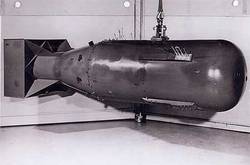The Allies were still at war with Japan in July 1945. Immediately after the  Trinity test, some scientists suggested that another explosion should be arranged in an uninhabited part of Japan, and witnessed by representatives of the Japanese government. They hoped that the bomb’s awful power would persuade the Japanese to surrender. They hoped that no nuclear bomb would ever be used in war.
Trinity test, some scientists suggested that another explosion should be arranged in an uninhabited part of Japan, and witnessed by representatives of the Japanese government. They hoped that the bomb’s awful power would persuade the Japanese to surrender. They hoped that no nuclear bomb would ever be used in war.
The American military had other ideas. On 6th August  ‘Little Boy’, a bomb using uranium-235, was dropped on the Japanese city of Hiroshima killing over 100 000 people. Three days later ‘Fat Man’, a bomb with a different design and using plutonium-239, destroyed Nagasaki. The Japanese Emperor surrendered on 10th August 1945, ending the Second World War.
‘Little Boy’, a bomb using uranium-235, was dropped on the Japanese city of Hiroshima killing over 100 000 people. Three days later ‘Fat Man’, a bomb with a different design and using plutonium-239, destroyed Nagasaki. The Japanese Emperor surrendered on 10th August 1945, ending the Second World War.
The Manhattan project represented a watershed in the relationship between physics, physicists and politics. Years later, one of the atomic scientists recalled,
 Some scientists who worked on building the bomb felt an obligation to inform the public of the awesome consequences of a nuclear war. We made public speeches about the bomb and about or hopes for international understanding. We talked to civic groups, we wrote articles, we tried to create committees of well-known people, such as the
Some scientists who worked on building the bomb felt an obligation to inform the public of the awesome consequences of a nuclear war. We made public speeches about the bomb and about or hopes for international understanding. We talked to civic groups, we wrote articles, we tried to create committees of well-known people, such as the  Emergency Committee of Atomic Scientists, headed by
Emergency Committee of Atomic Scientists, headed by  Albert Einstein.
Albert Einstein.
 These last four decades have taught us one important lesson: negotiations to reduce the level of nuclear weapons have little chance of success in a prevailing atmosphere of fear, distrust, confrontation and increasingly offensive and defensive weapons development.
These last four decades have taught us one important lesson: negotiations to reduce the level of nuclear weapons have little chance of success in a prevailing atmosphere of fear, distrust, confrontation and increasingly offensive and defensive weapons development.
[p212 and p 217, Victor Weisskopf (1989) The Privilege of Being a Physicist]

- The scientists felt that the bomb was their brainchild. Why did the American generals not listen to them? Do you think the scientists were naïve?
- Could scientists have stopped the development of the nuclear bomb by leaving when Jo Rotblat did?

 Hiroshima and Nagasaki - the aftermath
Hiroshima and Nagasaki - the aftermath





 Trinity test
Trinity test ‘Little Boy’
‘Little Boy’ Emergency Committee of Atomic Scientists
Emergency Committee of Atomic Scientists Albert Einstein
Albert Einstein Hiroshima and Nagasaki - the aftermath
Hiroshima and Nagasaki - the aftermath
What's your opinion?
Average rating




Not yet rated